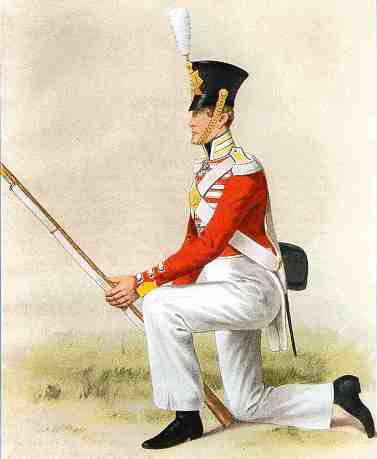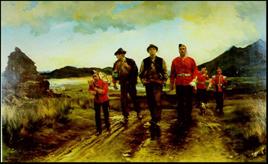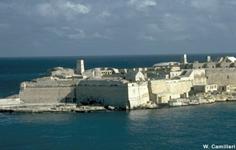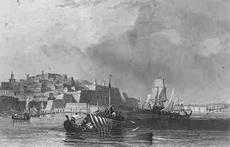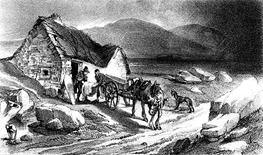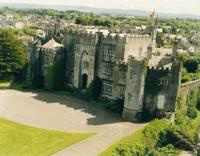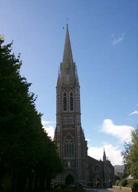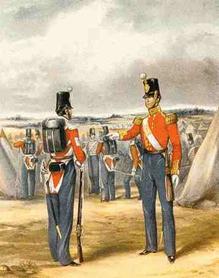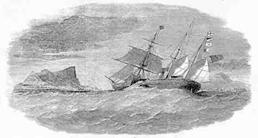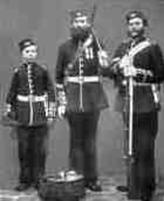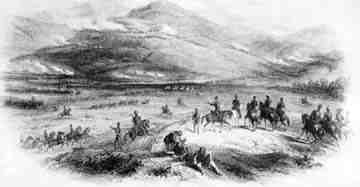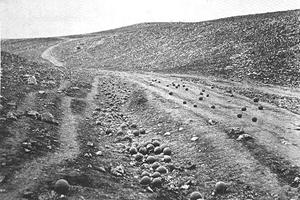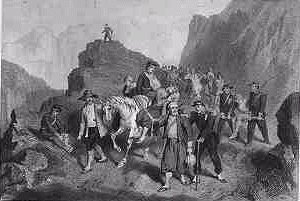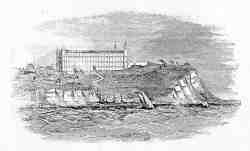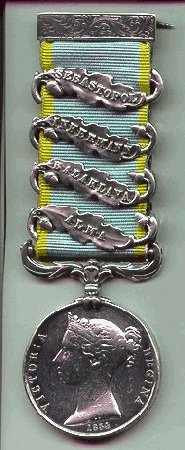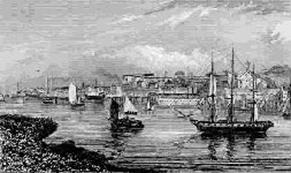Sergeant, 88th of Foot, The Connaught Rangers
|
Rogerstown |
|
John Connor was born in Rogerstown, Drogheda in |
|
Army Service |
|
|
24 Oct 1839 |
Enlisted as a labourer from Meath, being paid 1/1d
(one shilling and one old penny) per day from that date |
|
1 Jan 1840 to 31 Mar 1840 |
Absent from general muster whilst in |
|
15 Apr 1840 |
Muster book shows him as absent without pay, but
no ensuing disciplinary action is recorded, such as loss of pay |
|
4 Oct 1847 |
Awarded good conduct badge |
|
9 Apr 1848 |
Promoted to corporal |
|
25 Oct 1849 |
Awarded second good conduct badge |
|
4 Apr 1854 |
Embarked with service companies for |
|
10 May 1854 |
Promoted to sergeant |
|
5 November 1854 |
|
|
6 November 1854 |
Surgeon's report states that his ring finger on
his left hand was amputated |
|
10 July 1855 |
Discharged |
|
Enlistment |
||
|
John enlisted in At the time he was 5' 8½" tall, had
grey eyes, brown hair and was of pale complexion. The pay and muster books
record that he was paid a bounty on enlistment of £3 17s 6d and the
recruiting sergeant received 18s 6d. |
|
|
|
|
They also record his occupation as a baker of At the time of his enlistment the Connaught
Rangers were stationed at Richmond Barracks, |
|
|
|
|
|
During this time John was selected as one of a
group men under Corporal William Joyce escorting William Duddy, a deserter of
the 64th Regiment from His colleagues were Private Michael Barry, Private
Stephen German (who replaced Private John Grace at the last minute) and
Private Jerome or Heron. Their part was the 4 day march from John went absent without leave (AWOL) on the 11th
and 12th May 1840 for which he was deducted two days pay but no other
disciplinary action seems to have been taken |
|
|
The incidence of AWOL seems high in the records
and appears to be tolerated. In the third quarter of 1840 he was stopped two
day’s pay whilst he was on board ship. The reason for him being on
board ship has not been specified. For 34 days in the months of October and November
1840 John was in General Hospital but the cause of this is not known. |
|
|
|
|||
|
Shortly after he was released from hospital the
regiment left |
|
||
|
In |
|||
|
|
For the whole of 1841 and 1842 John was shown as
being with the regiment. There are some occasional absences explained by
hospital interment and guard duties. During most of 1843 he is shown on detachment for
unspecified reasons. This continues until March 1844 when he is shown in
hospital again. |
|
|
|
On March 18th he left |
|||
|
|
|
The 88th left |
|
|
|
John Connor next appears in the records on October
3, 1844 at the Depot Battalion in Voucher No.52, to cover the expense of "one
man from John moved from |
|
|
|||
|
John and the Depot Battalion of the Connaught
Rangers found themselves returning to their Irish homeland at the start of
the Great Potato Famine and they did not leave again until the end of the
famine was in sight. As soldiers of the British Army their usual diet
was meagre, although during the years of the famine this food must have been
welcome when compared with the hardships their parents and families were
suffering. Standard daily rations consisted of a pound of bread, eaten at
breakfast with coffee, and three quarters of a pound of meat, boiled for a
midday meal in large cookhouse coppers. The 88th spent their first year in Boyle, Co
Roscommon and, during this time, John was detached to A writer in the United Service Gazette a few years
later says of the Connaught Rangers of this period: |
|||
|
"Perhaps the
whole world does not furnish a more striking instance of the influence of
military discipline upon the Irish character than is supplied in the gallant
88th, the Connaught Rangers. The regiment is
composed entirely of Irishmen recruited for the most part in the |
Bringing
out the dead during the Potato Famine |
||
|
It is a fact of
which the glorious 88th may be proud, as it is of the laurels so gloriously
earned in the Perhaps these comments should also be viewed in
light of the famine as |
|||
|
|
Birr was possibly where John met his future wife,
the widow Anne (Robinson) Melsop. Anne’s first husband, Thomas Melsop was in
the 16th Lancers and he may have been killed during the Sikh Wars of
1845-1846. Widows of men killed in action received no support but were
expected to rely on charity – widows’ pensions were not
introduced until the time of the Boer War, around 1900. On October 4th 1847 John was awarded his first
Good Conduct Badge and an extra penny a day in his pay. |
||
|
Sometime later during the same October the Depot
Battalion moved from Birr to Tralee, Co Kerry, and Anne Melsop must have gone
with them. On 30th October 1847 there is a marriage by licence
at Tralee Registrar's Office of a Private John Connor (son of Richard Connor,
a carpenter) of the 88th Regiment (bachelor of full age) resident at Tralee
Barracks to Anne Mellsop (widow, servant) living at Well Lane, Tralee in Co
Kerry. Her father is given as John Robinson, a trader. The marriage was
witnessed by Margaret O'Sullivan and Patrick Sullivan. It appears from later research that John was Roman
Catholic and Anne was Protestant which may have been the reason for the
Registry Office marriage. According to the pay and muster rolls John Connor
was promoted to Corporal on April 9, 1848. |
|
||
|
John’s firstborn son, Richard Connor, was
born in On October 20, 1849 John Connor was awarded his
second Good Conduct Badge and a second increase of one penny a day – he
then received 2d. per day extra. As a Corporal, John’s basic salary
would be 1s.6d. per day plus the two Good Conduct Pays of 1d. each. The Depot
Battalion remained in Tralee until April 1850 when they moved to Castlebar
where they remained until the end of the year and then left Whilst in Castlebar, John and Anne had a second
son, whom they named John and he was baptized at the Catholic Church on May
10, 1850. Unfortunately, young John must have died at an early age as the
couple named another son John a few years later. |
|||
|
The Kerry Recruit |
|
|
At the age of nineteen, I was
diggin' the land Chorus: To me Kerry-I-Ah, fa lal deral lay, So I buttered me brogues and shook hands with me spade Then up came a captain, a man of great fame, Well the first thing they gave me it was a red coat The next thing they gave me they called it a horse The next thing they gave me, they
called it a gun, |
The next place they took us was down to the sea, We reached We whipped them at All dyin' and bleedin' I lay on the ground, But a surgeon come up and he soon staunched the blood, Now that was the story my
grandfather told, |
|
|
||
|
The first six months of 1851 were spent in Bury, Lancashire,
after which the battalion moved to During the period 1851-1854, the regiment moved
extensively around the south of In
February 1853 the regiment went off to Haslar and |
|
|
|
The regiment returned to Bury on August 20, 1853,
taking the train from The immediate political background to the Crimean
War can be traced to November 30, 1853, when the Russians destroyed the
Turkish fleet at the Black Sea Military preparations began which directly
concerned the Rangers towards the latter part of 1853, and in February 1854
it was intimated that the 88th would be included in an expedition then being
organized for the John was with one of the two detached companies in
Stockport, On March 28th war with |
||
|
The Niagara off |
At John embarked on the Cunard steamer Niagara with
the Service Companies (entire battalion) at noon on April 4, 1854 and set
sail for the The Niagara reached |
|
|
Leaving Malta the same night the 88th landed at
Scutari, opposite Constantinople (now Istanbul), on the 19th and took up
their quarters in the Turkish barracks, a large building that would
subsequently become famous as the hospital where Florence Nightingale and her
nurses tended the wounded and those who fell ill from rampant disease. John
was to be an inmate of Scutari, as we shall see later. |
||
|
|
||
|
The 88th joined forces with the 77th and 95th and
became known as the "Yellow Brigade", all three regiments having
yellow facings on the uniforms. They shifted out of the barracks into tent camps
to make room for more incoming regiments from On May 10th, Corporal John Connor was promoted to
Sergeant. On May 29th the regiment embarked on the Cambria
for The tent allowance was one tent for every fourteen
men and the men’s kit (in knapsacks) was ordered to be reduced to a few
necessities only. "The remaining
articles," wrote Colonel Stevens in an early history of the
88th "were left behind in those most useless of
inventions, the squad-bags, which were confided to the care of a rascal at
Pera, and were, I believe, never seen again: at least I never got back the
articles which I left in his charge." |
Connaught Rangers in uniform of the time of the
Crimean war |
|
|
Later, we shall see John’s discharge papers
show he claimed for lost kit – at least we know what happened to it. |
||
|
On June 1st the regiment was at The days in The boredom came to a halt with the first outbreak
of cholera on July 23rd. From then on their camping ground was frequently
changed in the hope of counteracting the epidemic but the cholera spread
throughout the Allied army and continued during the rest of the summer and
autumn. The situation of the war changed at this time and
the Allied forces were ordered to return to the Crimea from Between the end of July and the time they set sail
the 88th had forty-nine deaths from cholera, two from fever and many men were
left behind in hospital in Many of the horror stories reported in the popular
press of the day stem from the time that followed this landing back in the A writer recorded a description of the Connaught
Ranger’s and John’s first night ashore which reads: "This, our
first experiment of lying down to sleep in the open air can never be
forgotten. The officers had no baggage beyond such as each could carry, and
the knapsacks of the men having been left on board the Orient each man had
only a shirt and a pair of boots wrapped in one blanket, with three
days’ rations of salt-pork and biscuit. It rained heavily all night and
was extremely cold. As only grass and furze could be obtained no fires would
burn more than a few minutes, thus nothing could be cooked and the few
articles the men had brought were soaked." |
||
|
The |
Six days later was the They immediately marched towards Sebastopol as
siege operations had become necessary and they pitched camp near John and his colleagues were still sleeping in the
open until October 4th when an officer managed to obtain tents for the
division from |
|
|
"Our days
passed very much alike: after being under arms before daylight (exceedingly
cold work), the remainder of the day, when off duty, was passed as best we
could in camp visits or trips to |
||
|
Sometime during this month John sent his wife,
Annie, another £1 from his pay. John spent the rest of his time on
12-hour day or night sentry duties in the trenches or as a member of one of
the working parties who were constructing a twenty-one gun battery in
preparation for the Siege of Sebastopol. |
||
|
The |
|
The first bombardment lasted six days until
October 25th when an attack by the Russian army brought on the Battle of Balaklava
in which the 88th, as a unit, was not involved. It was here that, through an
error in the transmission of orders, the light cavalry brigade under Lord
Cardigan charged massed Russian artillery in that most famous of all cavalry
charges – The Charge of the Light Brigade. Also at |
|
The |
||
|
The next day, the 26th, John saw action repulsing the
Russians in the first Battle of Inkerman but the battles of the 25th and 26th
were only preliminaries to an event vastly more serious. The great Battle of
Inkerman, or "the Soldier's The battle raged for almost the whole day, and was
prosecuted in thick fog, heavy undergrowth, and with little if any
generalship being shown on either side. As dusk fell, the British held the
field (having received useful, if belated, help from the French). The numbers
of the Russian dead left on the field exceeded the numbers of Allied troops
that had been attacked. The Battle of Inkerman was fought on November 5th
and Sergeant John Connor was shot in the ring finger of his left hand. It
appears from the records that John’s finger was amputated by surgeons
at the battlefield. |
Cannonballs
pepper the battlefield at Inkerman |
|
|
Removing
the wounded at Inkerman |
The surgeon's report (WO116/64)
gives this detail: ·
John Connor, Sergeant 88th Foot, age 34 ·
Place of Birth - Rogerstown, ·
Occupation - baker ·
Rate of pension - 1 shilling and sixpence
per day ·
Foreign service - 3 years in ·
Character - Good with 2 good conduct
increments and no recorded offences ·
Surgeon's remarks - amputation of ring
finger of left hand after gunshot wound at Inkerman |
|
|
The Inkerman clasp was awarded to all those who were
present on the battlefield, including many who were never engaged. On hearing
of the selection criteria for the various clasps, at least one infantry
officer railed at the powers that be for granting him a Balaklava clasp,
which he felt belonged to the cavalry alone, and granting the cavalry, who
never came under fire at Inkerman, the clasp for the latter battle, in which
over 17,500 men (mostly infantry, and mostly Russian) were killed or wounded. |
||
|
Scutari |
|
|
On November 7th John was sent to the hospital at
Scutari, arriving on November 10th, where he remained until January 10th. Scutari is where Florence Nightingale started her
reforms of the nursing profession and hospital standards. She was there at
the time of John’s treatment and it is possible that he saw her during
his stay. Considering the horrendous standards of the time it’s
surprising that he survived his treatment in Scutari and did not succumb like
so many others. Figures show that the death rate in the |
|
|
We must remember that John and the men of the 88th
had had no change of clothing since mid-September when they left their
knapsacks on the Orient. Their clothing and boots were constantly wet and
infested with vermin and when the Orient finally arrived at Due to much skill, and underhand deals, their
Colonel and their Quartermaster obtained tents, rations and cooking pots
which alleviated some of the suffering. Cholera, diarrhoea and frostbite
were, however, prevalent and scurvy appeared by the spring of 1855 as the
soldiers’ diet consisted entirely of salt meat. Despite bloody victories over the Russians on the
River Alma and at the Battles of Balaklava and Inkerman, the war dragged on,
as the Russians refused to accept the allies' peace terms. Finally, on
September 9 1855, John was luckier than many and was sent home by
troopship on January 10th 1855, whilst the rest of the regiment was preparing
for the main Siege of Sebastopol. |
|
|
Discharge |
||
|
After John’s arrival in |
|
|
|
|
John was formally discharged from the Connaught
Rangers, at His discharge papers show some notes about pay discrepancies
during the course of the Crimean War and he also claimed for the loss of his
kit which, as shown above, was stored and ransacked at the start of the war. |
|
|
He was discharged aged 34 years and 4 months old
as a sergeant (trade as a baker) standing 5' 8½" tall. He is
shown as having no distinguishing marks, despite being declared unfit for
service following the amputation of a finger on his left hand, having served
15 years 260 days. He served 8 years as a private, 6 years as a
corporal and 343 days as a sergeant, earning 2 good conduct medals. John
Connor may have been awarded the Crimea Medal (an example of which is shown
here) with two clasps for Alma and Inkerman. Following his injury he was not
present at Pension records for mid-1855 showed John Connor on the list of pensioners with a Kilmainham admission number of #1897. |
||
|
There was a repeat of his medical record and he
was awarded a disability pension of 1s.6d. per day. The space where the pensioner’s
place of residence could be recorded was left blank. |
||
|
|
|
Twins were born to John and Anne and baptised
Edward Inkerman Connor and Mary Anne Alma Connor on March 3, 1856 at St
Mary’s Catholic Church, Drogheda, On 10th May 1858 at St Peter's A Joseph was baptised in John and Anne were to have at least seven children
– Richard (1848), John (1850), Lawrence Patrick (about 1854), twins
Edward Inkerman & Mary Anne Alma (1856), another John (1858) and Joseph
(1860). The last four children were all baptised in Drogheda, Co The notes on John’s records are confusing as
they show pension increments dated 1881 but, according to the marriage
certificate of his son, Richard, John was deceased by 1876. Although the
payments might have been to John’s widow this seems unlikely
considering the fact the widows’ pensions were not introduced until
around 1900. As yet the record of John’s death has not been found. |
|
This biography is a joint effort. The collaboration
of Kathleen Andersen, Teresa Ripper & Ken Ripper has brought this
biography into existence. |

